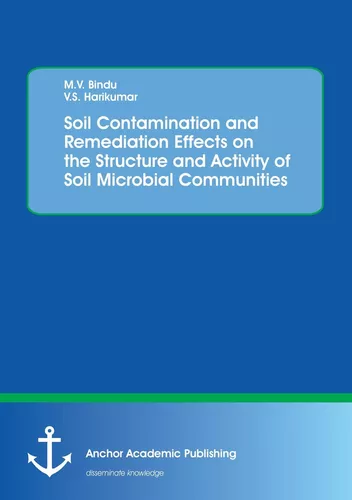Skip to the end of the images gallery Navigation umschalten
Skip to the beginning of the images gallery Navigation umschalten

Soil Contamination and Remediation Effects on the Structure and Activity of Soil Microbial Communities
Paperback
244 Seiten
ISBN-13: 9783960670483
Verlag: Anchor Academic Publishing
Erscheinungsdatum: 25.08.2016
Sprache: Englisch
Farbe: Ja
69,99 €
inkl. MwSt. / portofrei
Ihr eigenes Buch!
Werden Sie Autor*in mit BoD und erfüllen Sie sich den Traum vom eigenen Buch und E-Book.
Mehr erfahrenSoil can be defined as the space time continuum forming the upper part of the earth’s crust. It is a natural body comprised of solid, liquid and gases that occur on the land surface. Joffe (1949) defined soil as a natural body differentiated into horizons of mineral and organic constituents usually unconsolidated of variable depth, which differs from the parent material below in morphology, physical properties and constitution, chemical properties and composition, and biological characteristics. Soil is one of the most fundamental resources for sustainability and survival. It is one of the most important assets to protect and pass on to future generations.
Soil contamination due to anthropogenic and natural sources is increasing day by day because of increasing population, industrialization, and urbanization. Soil is the receptor of many contaminants from various sources. Contamination decreases the quality of the soil and adversely affects soil organisms.
For this study, soil samples from thirteen locations contaminated from agricultural, industrial, and organic sources spread over the districts of Alappuzha and Kottayam in Kerala in the south west coast area of India were analyzed to study the changes in soil characteristics and its influence on soil microbial communities and their activities.
Soil contamination due to anthropogenic and natural sources is increasing day by day because of increasing population, industrialization, and urbanization. Soil is the receptor of many contaminants from various sources. Contamination decreases the quality of the soil and adversely affects soil organisms.
For this study, soil samples from thirteen locations contaminated from agricultural, industrial, and organic sources spread over the districts of Alappuzha and Kottayam in Kerala in the south west coast area of India were analyzed to study the changes in soil characteristics and its influence on soil microbial communities and their activities.
Eigene Bewertung schreiben










Es sind momentan noch keine Pressestimmen vorhanden.